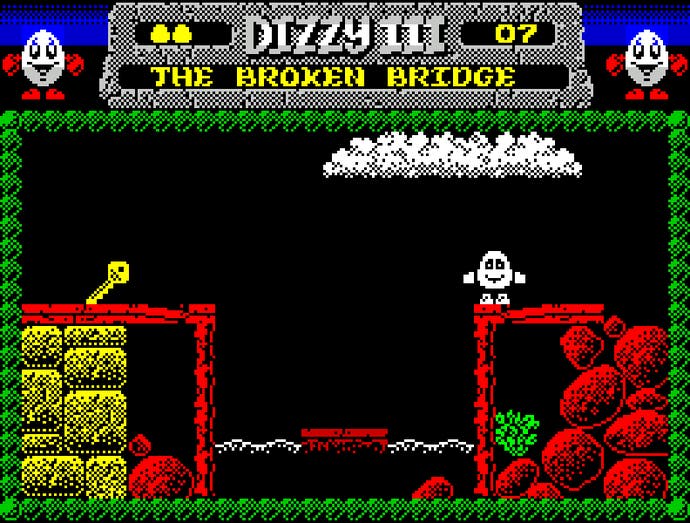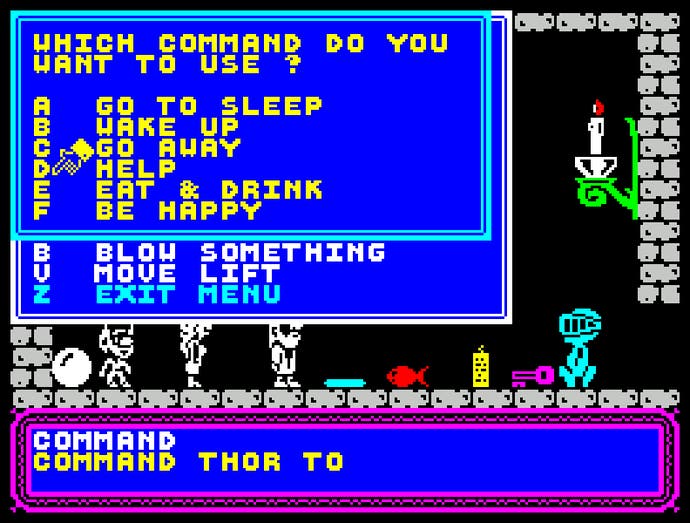Retrospective: The Good Old Days
Games for the hard of spending.
Buying budget games was like purchasing a 59p game from the App Store based solely on the screenshots and the publisher's comments. The low cost and the general quality of titles meant that you'd rarely feel ripped off.
I'd estimate that for every 10 budget games available, two would be wretched, seven would be pretty good for the price, and one would be as good as a full price release - perhaps even better.
Those in the top 10 per cent included several quality titles written by industry good guys John and Ste Pickford and published by Mastertronic. There was darts sim 180, zany platformer Zub, isometric bug blaster Amaurote, and wizard warfaring action thing Feud.
Mastertronic also published a couple of brilliant 'bike' games. Kikstart 2 was the superior sequel to the original trial bike race game. It was unofficially based on the BBC TV series Kick Start, where kids who were clearly superior to you and I rode bikes over ramps and barrels in a muddy field somewhere.
Action Biker is probably best known for starring Clumsy Colin from the old KP Skips crisps commercial. It should really be remembered just for being a great game (only on the Commodore 64 and Atari 8-bits though - the Spectrum version was completely different, for some bizarre reason).
The Firebird Silver label was also home to some top cheapies. The best included Booty, a neat little platformer set on a pirate ship, and Rebelstar, a classy turn-based strategy game from genre supremo Julian Gollop. Firebird also deserves slaps on the back for bringing the BBC Micro masterpiece Thrust to other 8-bit computers as a budget title.

By comparison, Codemasters became a bit of a joke thanks to the number of mock 'simulator' games the company whizzed out - BMX Simulator, SAS Combat Simulator, Professional Cow Tipping Simulator etc.
Codies did manage to redeem itself with the long-running Dizzy series. These colourful cartoon adventures, created by the dependable Oliver Twins, were generally excellent, with the third entry Fantasy World Dizzy being the pick of the bunch.
But even when Dizzy was at his best, for me personally he couldn't top the marvellous Magic Knight, star of four budget games written by David Jones and published by Mastertronic.
The first, Finders Keepers, was a slightly uneven mix of platforming, puzzle and maze elements, yet the sequels - Spellbound, Knight Tyme and Stormbringer - were really clever graphic adventures that completely belied their budget game status.
Knight Tyme was also the first game to be designed specifically for the new, bigger memory Spectrum 128. The budget price meant less risk for the publisher should a game fail, so Mastertronic regularly released games for the minority formats that the full-price publishers overlooked.

If you owned a Commodore 16 or an Atari 8-bit, the only UK software houses regularly releasing games for your machine were Mastertronic and Firebird. And as the Nineties rolled around and the 8-bit computer market shrank as owners upgraded to flashy 16-bit machines, it was the budget publishers like Alternative, Hi-Tec and Zeppelin who were plugging away at the bitter end.
As for me being thin - it's a bit embarrassing, really. I've left it to the end in the hope you will have stopped reading by this point and are instead posting your budget game memories in the Comments section.
OK, this is what happened. At school I was given 50p a day to buy some lunch from the canteen, which in the eighties was plenty of money for a decent meal. But I'd spend 10p on a pack of Space Raiders and squirrel away the other 40p. At the end of the school week I'd have the magic sum of £2, which I'd spend on a shiny new budget game.
Jamie Oliver would probably disapprove, but I did this for months and months and my software collection swelled with budget gems. And apart from a slight case of rickets, it never did me any harm.
